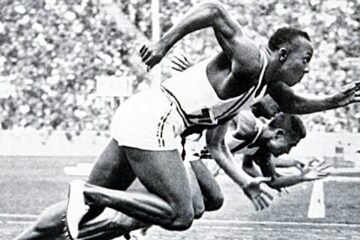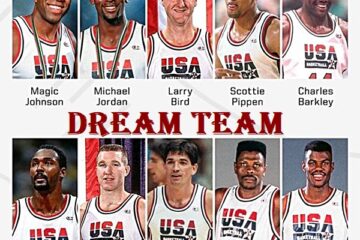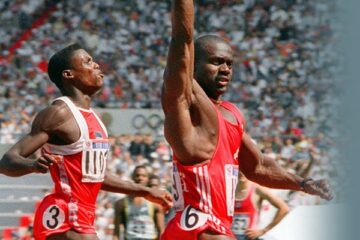Football in the Olympics | Part 2 (1936-1948)!
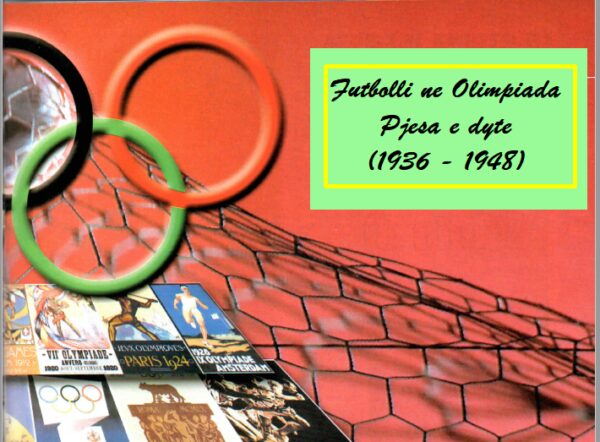
Part 2 (1936-1948)!
Italy winning the only Olympic title.
Annibale Frossi, the player with glasses, the best scorer of the tournament.
In the 1932 Olympics in Los Angeles, football is not included in the games program; great cost for the travel of the European teams to the American continent. 1936 – Berlin Adolf Hitler wants the Berlin Olympics to “shock the whole world”, to be strongly distinguished as a perfect propaganda instrument. And that’s right, the organization and the sports facilities are monumental…. The trainer of the “Azzurra” team, the strategist Vittorio Pozzo, among others, writes: “…the greatest, the most brilliant, the ones not comparable until that moment organized. …”
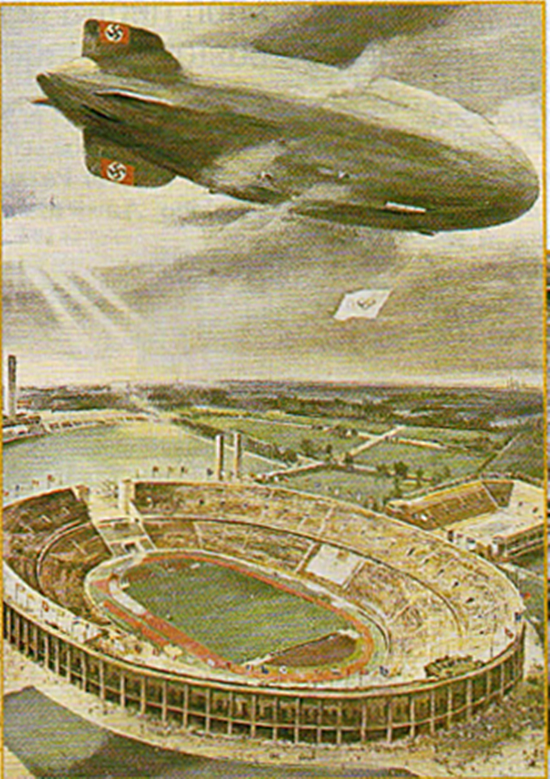
In the Italian football tournament, there are officially players registered as university students who are in the process of receiving their doctorates, Foni, Negro, Scarabello, Bertoni and …. Frossi.
It is not the best selection, they are not portraits of the first plan. There is no player who had previously participated in the Olympic tournament with the first national team. The incomes of the footballers, now although they are professional, are designated as study fees, to keep that dilettante spirit of the Olympics; the least within the formality, it is not played for profit but for fun…..in Italy professionalism has not been declared yet.
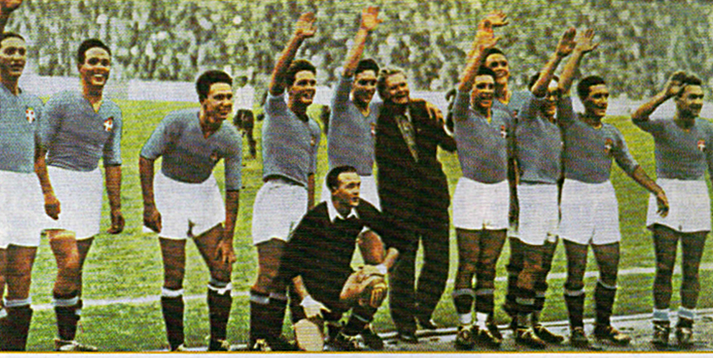
Italy – two-time world champion, participant in the 1948 London Olympics
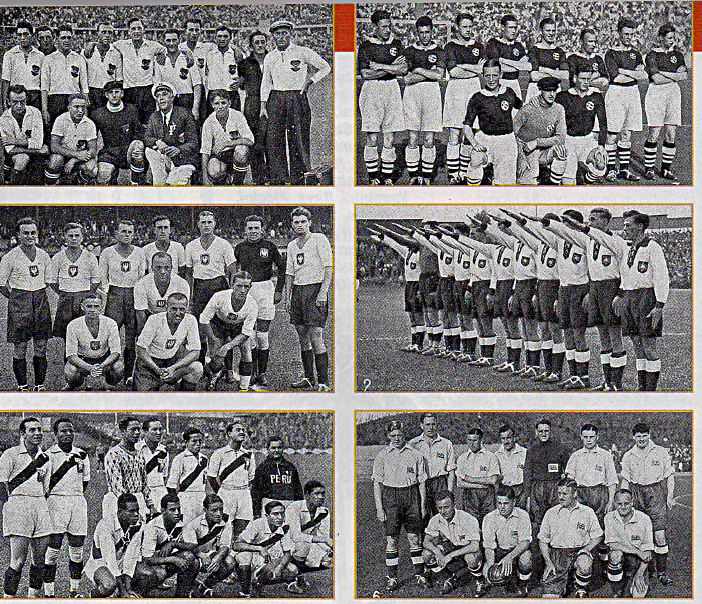

Participating teams of the tournament
The football Olympics in Berlin is of a high level but not absolute; absent are Uruguay, Czechoslovakia and Belgium, the winners of the previous editions. The start of the “Azzurra” team is in the right tone, 1-0 against the USA in the first game with a goal by Frossi in the 58th minute (in the 50th minute Rava was sent off for improper behavior) a match with elimination directly. Pozzo speaks to them in an unusual tone, and in the quarter-finals they achieve a “stealing” 8-0 result against Japan (4 goals by Biasi, 3 by Frossi, and one by Cappelli) who had defeated Sweden in the round of 16. it’s 3-2. August 8, 1936 in the “Olympiastadion” Italy and Norway are presented on the field to play the semi-final in the presence of 90,000 spectators.
The Norwegians present a completely professional team, the first national team, the same formation that “knocked out” the local team Gjernanine (2-0). And the victory with the most difficulty for the “Azzurra” was achieved in extra time (2-1), with a decisive goal by ….the man with glasses Annibale Frossi in 96′.
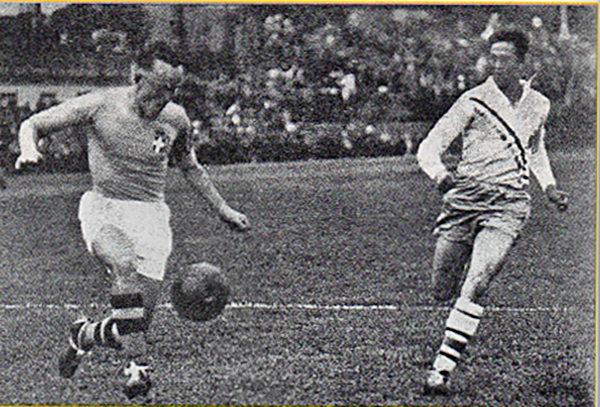
Frossi in action for the Italian team in the match against the USA, which they won only 1-0
The match on the field of play was very tiring, and with an exhausted Italy defending in the last minutes. A physical battle but without holding back anger: the fact is that one day after the challenge, Pozzo invited them, the Scandinavians, to the bus of his team, Italy, to give them a “trip” that was willingly accepted by the Norwegians.
The last act. The final.
August 15, 1936. Italy and Austria: “Azzurri” in the field with this formations:
Italy: Venturini, Foni, Rava, Baldo, Piccini, Locatelli, Frosi, Marcchini, Bertoni I, Biaggi, Gabriotti.
Still continuing with the memories of coach Pozzo written in his diary:
“And who would have dreamed of playing in the final of the Olympics against Austria…but again nervousness tends to conquer our boys! Did you make it this far and then lose the final? Oh, this can’t be, just like that! In the five days between the semi-final and the final, to help us was…..Jesse Owens yes, yes exactly that “il negro” who had or was getting ready to win the 100m, 200m, the long jump, and the 4x100m relay.
He lived in the Olympic village not far away, two steps from us (from the apartment of the Italian staff). He came to visit with a guitar and an accordion, singing and dancing…” But let’s go back to the finale. The teams have gone down to the field. Austria appears against Italy after eliminating the strong Peru team in the quarter-finals, even though it was sent off the field and lost 4-2 (in fact, the organizers had ordered the replay of the match after some South American fans had invaded the field after the third goal to their team, then Peru, offended for what it calls unconscionable by using the task, prefers to withdraw from the field). Italy in front of an audience against in support.
The 70th minute of the match comes and here is the “man with glasses” Frossi who has overtaken the Italian team 1-0, benefiting from a group of players in the penalty area. Only 10 minutes later, and at the same time towards the end of the game, Kainberger equalized the result 1-1 (80′); It takes 120` of suffering in the final as well, and the hero is always the same Annibale Frossi, when he scores in the 92nd minute, giving the Italian team the 2-1 victory and the gold medals.
Frossi has just been bought by Ambrosiana-Inter, the top scorer of the tournament with 7 goals. From Friulli, the “ala” player on the right plays with a pair of glasses made of unbreakable lenses specially prepared by Pozzo, tied behind the ears with an elastic string.
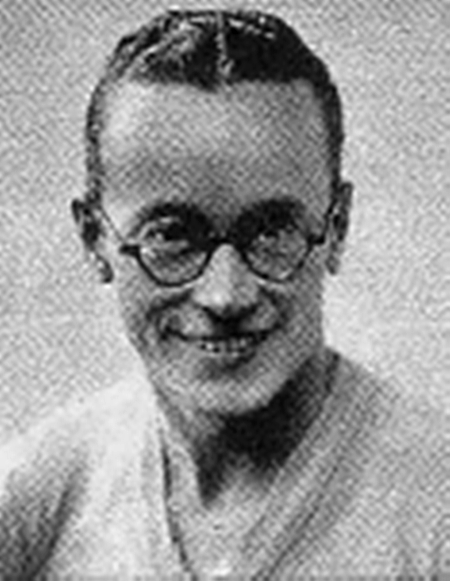
Anibale Frosi – also called “il dottore sottile”
Signs of his fabrication will immediately be made, and he who years later will become a successful trainer, will be called “il dottor sottile” (the intellectual with sight sharp).
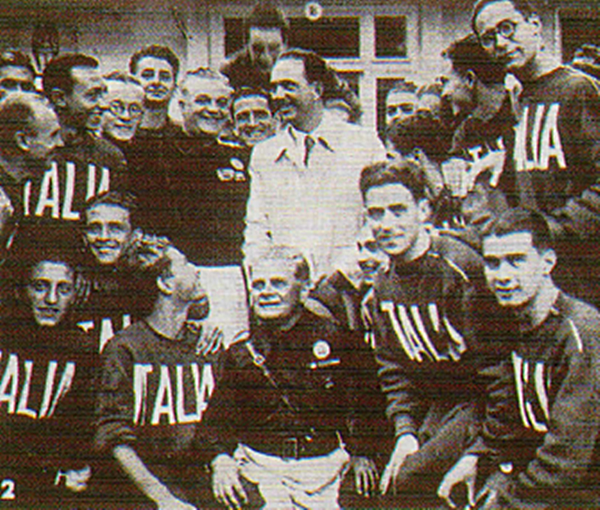
The Italian team, in the center surrounded by the players, Prince Umberto.
Vittorio Pozzo describes his team’s victory like this: “The second minute of extra time, Frossi scores in the Austrian goal….28 more of a battle tough, our players who fight like giants, the last greeting of the German referee Bauwens. Finally, the Olympics is our property. Run on the field, the players fly around me, hug me, …. they call us in front of the honor stand. Somewhere there are two sailors waving the tricolor flag…all around, the 100,000 spectators who were against us before are now standing and greeting us. And we stand “ready” while the notes of the hymn are played. I believe that it is only me (Pozzo) crying, but not all the boys are in tears, they are all crying……
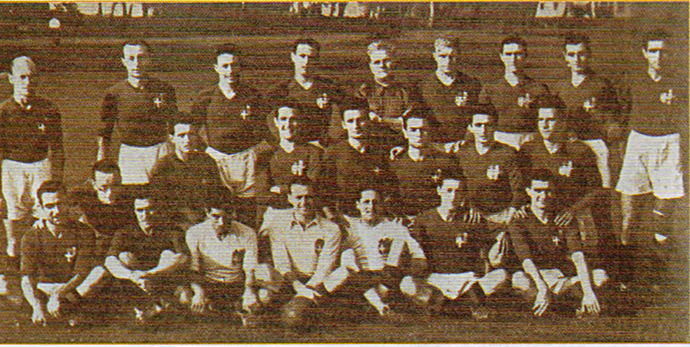
Italy Champion Team Top from left: Niccolini, Negro, Marcchini, Bertoni, Pozzo, Girometta, Biaggio, Scarabelli, Cappeli. (in the center) Baldo, Piccini, Puppo, Gabriotti, Locatelli, Giuntoli. (below, seated) Petri, Frossi, Foni, Vanucci, Venturini, Gianni, Rava, Tamietti
Final
Berlin: August 15, 1936
Italy Austria 2-1 (120`) 70`Frossi (I); 80 `Kainberger (A); 92`Frossi (I)
Places 3-4 Berlin: 13 August 1936 Norway – Poland 3-2
Final ranking:
1 – Italy: Venturini, Foni, Rava, Baldo, Piccini, Locatelli, Frossi, Marchini, Bertoni I, Biaggi, Gabriotti , Scarabello, Cappeli, Negro.
2 – Austria: E. Kainberger, Kargl, Kunz, Krenn, Walmuller, Hofmeister, Werginz, Laudon, Steinmetz, K. Kainberger, Fuchsberger, Mandl, Kitzmuller
3 – Norway: Henry Johansen, Eriksen, Holmsen, Ulleberg, Juve, Holmberg, Frantzen, Kvammem, Martinsen, Isaksen, Brustad, Monsen, Horn, Hnasen.
1948 – London
After the end of the second world war, the Olympiad returns to British territory after 40 years, when it organized the first edition of the football tournament. A year that does not mark any very big historical event in sports, but the important thing is the message of hope and the resumption of life. Although London was the capital half destroyed by the bombings, it again remained the main place in the organization of these games. The different athletes are waiting in military silos and exactly these athletes have been given a ration of food and a liter of milk every day as supplements. The US Olympic team put a special plane available for their staff to bring special and more abundant food, meat, eggs, milk, chocolate, etc. In the 18 participating teams of the football tournament, Italy, England, France and Ireland do not participate with their big teams. The team of the Soviet Union takes part for the first time.
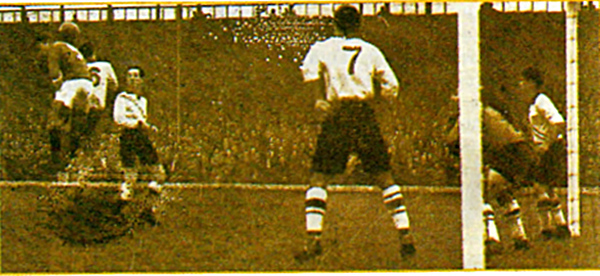
From the match Italy – USA 9-0! Pernigo’s header.
In this edition, Scandinavian football dominates with Sweden as the protagonist, which does not disappoint the predictions of the start of the tournament. The brain of this team is….Nils Liedholm, for whom the coach of the Swedish national Kock will say: “A team with 11 Liedholm would be invincible”! The other strong points of the team are Gunnar Nordahl, the best scorer with 7 goals, as well as the other brothers, Knut and Bertil Nordahl together with Gunnar Green. In the final, the Swedes beat 3-1 the representative of Yugoslavia, who was repeatedly whistled in the semi-final match against the English as the representative of the communist bloc …….
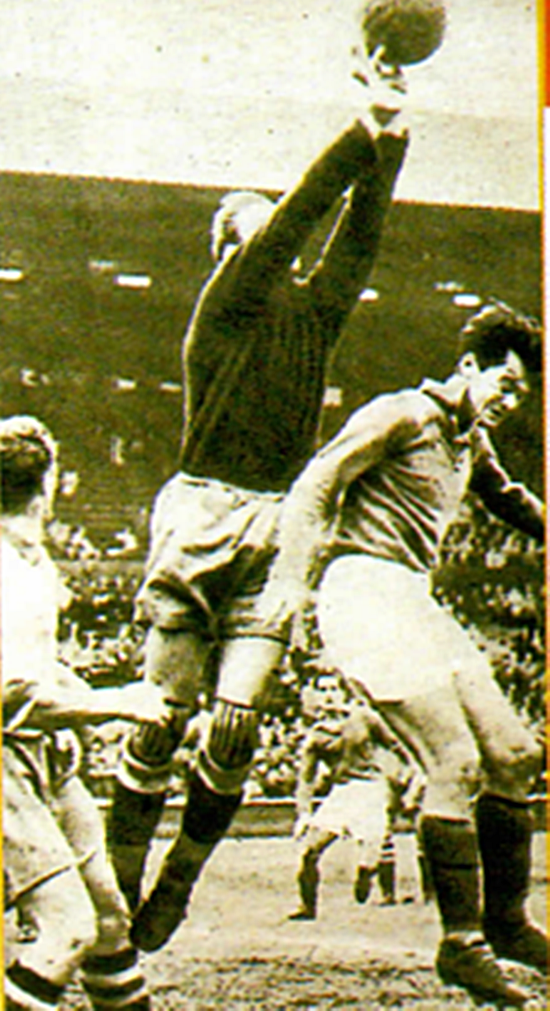
Photo taken from the final match. Swedish goalkeeper Lindberg and Yugoslavian Bobek
Final:
Londer 13 August 1948 Sweden – Yugoslavia 3-1
Countries 3-4 Londer 13 August 1948 Denmark – Great Britain 5-3
Final classification:
Sweden: Lindberg, K. Nordahl, Nilsson , Rosengren, B. Nordahl, Carlsson, Andersson, Rosen, Green, G. Nordahl, Liedholm, Leander.
Yugoslavia: Lovric`, Brozovic`, Stankovic`, Zo. Cajkovski, Jovanovic`, Atanackovic`, Cimmermancic, Mitic, Bobek, Zl. Cajkovski, Vukas, Sostaric`, Mihajlovic`, Wolfl, Tomasevic`
Denmark: Nielsen, V, Jansen, Overgaard, Pilmark, Oernvold, I. Jensen, Ploeger, KA Hansen, Seebach, Lundberg, Sorensen
Continue with other parts.
Meanwhile, this is the link for the first part: https://www.sportsvisionplus.com/football-in-the-olympics-part-1-1908-1928/
April 2021
________________________________________
Sports Vision + / The Hour of Champions in activity since 2013
Follow us:
Facebook: https://www.facebook.com/VizionSportiv
Dailymotion: https://www.dailymotion.com/kinetografiashqiptareartisporti
Blog: https://pierosportvision.blogspot.com/
Discover more from Sports Vision +
Subscribe to get the latest posts sent to your email.


